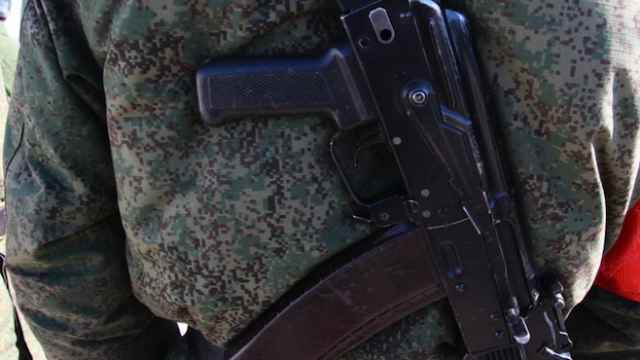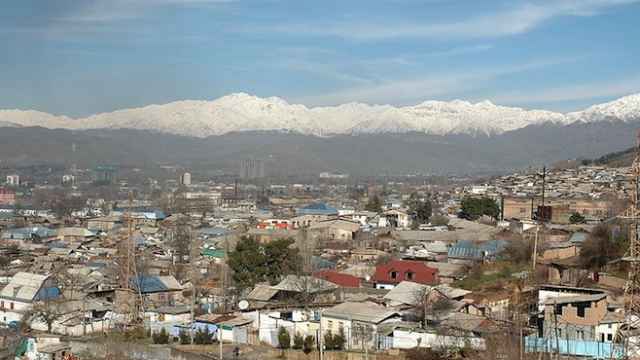This article originally appeared at Eurasianet.org.
A government anticorruption agency in Tajikistan headed by the president's son has made a move to broaden its remit by pursuing alleged Islamic extremists.
The Agency for State Financial Control and Combating Corruption said in a statement on July 13 that it has detained a group of suspected members of the Islamic Movement of Uzbekistan.
The charges being leveled — creating a criminal group, incitement to extremism and failure to report a crime — are notable for having little to do with financial misdemeanors as such.
It is typically the state security services that initiate such cases, which raises the suspicion that Rustam Emomali, who has been head of the Agency for State Financial Control and Combating Corruption since March, has ambitions beyond chasing down mere bribe-takers.
Emomali's agency said a resident of the northern Sughd region was detained after he was found with video and audio recordings of the late IMU leader Tahir Yuldashev, who is believed to have been killed in a U.S. drone strike in Pakistan's South Waziristan province in August 2009.
"It is believed that (Muhammadshod) Gafurjonov planned to use the the 'sermons' and 'appeals' of IMU amir Muhammad Tohir for extremists aims in Tajikistan," the agency said in its statement.
The statement carries on to accuse Gafurjonov of communicating with a countryman currently engaged in fighting in Syria for advice on how to lure Sughd youths toward extremist activities.
Another three people are suspected of failing to turn Gafurjonov in to the authorities, the agency said.
Since all criminal investigations and subsequent trials into Islamic radicalism in Tajikistan are shrouded in secrecy, there is no way to determine the credibility of the case.
With the all-pervasive level of graft in Tajikistan, it is surprising the anticorruption agency found time to address an issue not strictly within its brief. The country ranks 152 out of 175 in Transparency International's most recent Corruption Perceptions Index.
But this episode may be as much about politics as crime.
The anticorruption agency has in the past been accused by its detractors of serving as a cat's-paw for criminal-political factions looking to gain ascendency over others.
Some of its most recent prominent cases have focused on senior officials, such as Khasan Radzhabov, an adviser to the president who was arrested in June on suspicion of embezzlement and bribe-taking on a massive scale.
The Sughd case may signal an attempt by Emomali to secure more power for himself. Although still a youthful 27, Emomali is considered a possible candidate for eventual succession to his father, Emomali Rakhmon.
If Emomali is tempted to return to what his agency is actually tasked with investigating, there is the case of missing funds recently reported by The Economist. In 2012, Tajikistan's government spent $145 million recapitalizing a private bank that had handed out dozens of astronomically risky loans, many of them benefitting companies owned by relatives of the then-deputy prime minister, Muradali Alimardon.
The loans then disappeared, but the directed lending continued. The bank is now deep in the red and Tajikistan's whole banking sector looks on the edge of collapse.
Officials have signally ignored the little-noticed episode, which has illustrated starkly how investigation into financial murkiness is a selective business in Tajikistan.
A Message from The Moscow Times:
Dear readers,
We are facing unprecedented challenges. Russia's Prosecutor General's Office has designated The Moscow Times as an "undesirable" organization, criminalizing our work and putting our staff at risk of prosecution. This follows our earlier unjust labeling as a "foreign agent."
These actions are direct attempts to silence independent journalism in Russia. The authorities claim our work "discredits the decisions of the Russian leadership." We see things differently: we strive to provide accurate, unbiased reporting on Russia.
We, the journalists of The Moscow Times, refuse to be silenced. But to continue our work, we need your help.
Your support, no matter how small, makes a world of difference. If you can, please support us monthly starting from just $2. It's quick to set up, and every contribution makes a significant impact.
By supporting The Moscow Times, you're defending open, independent journalism in the face of repression. Thank you for standing with us.
Remind me later.





